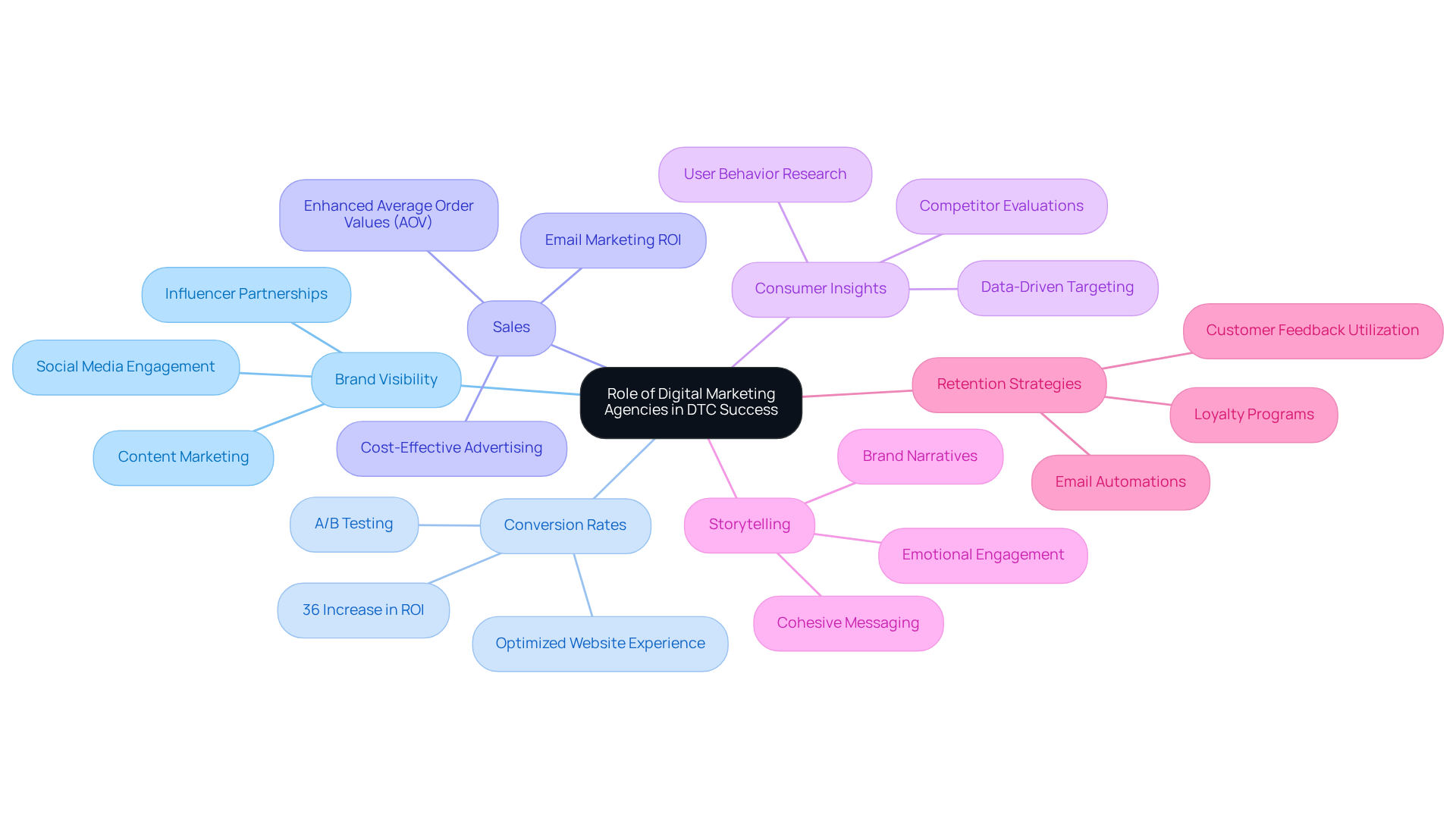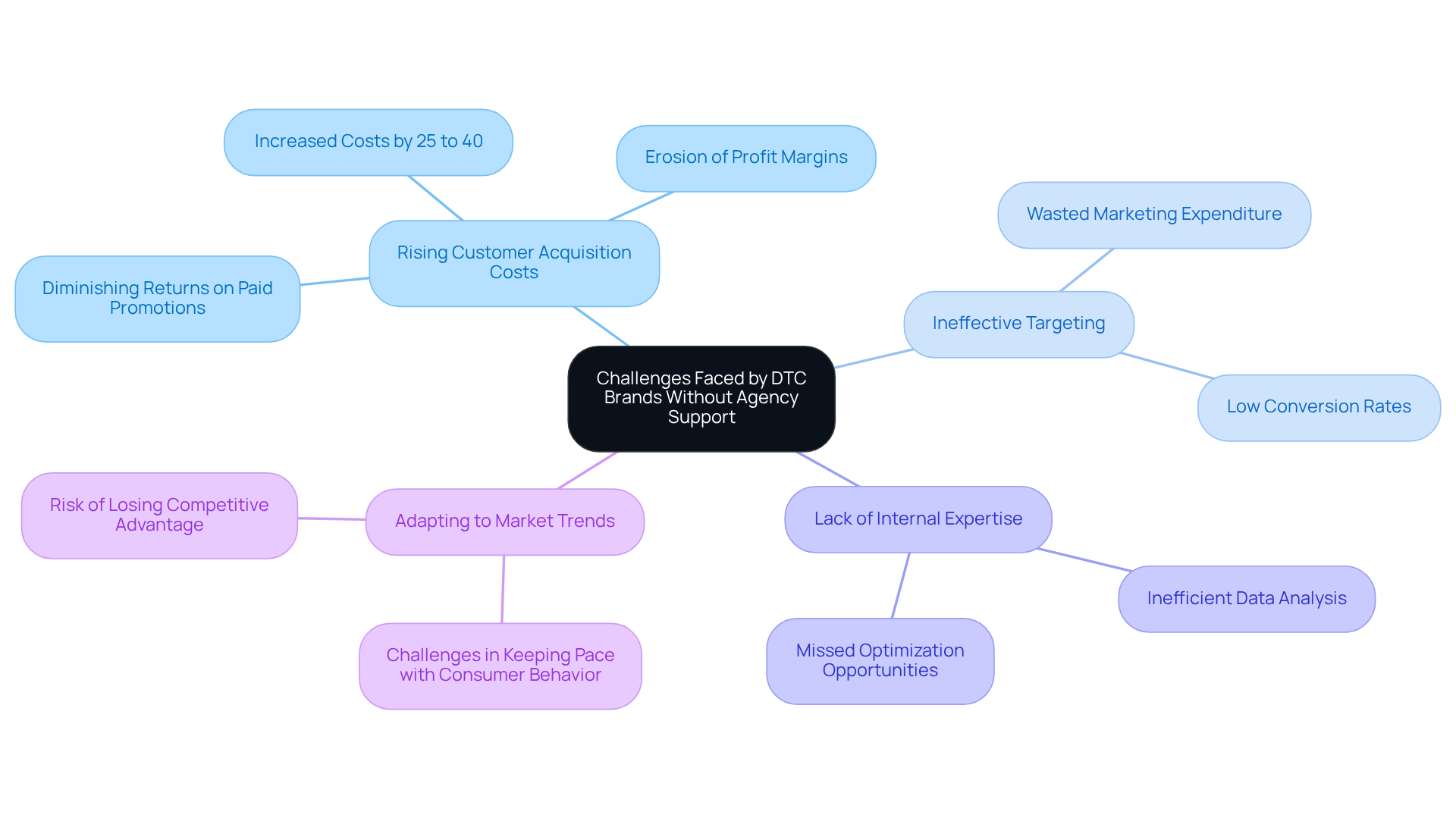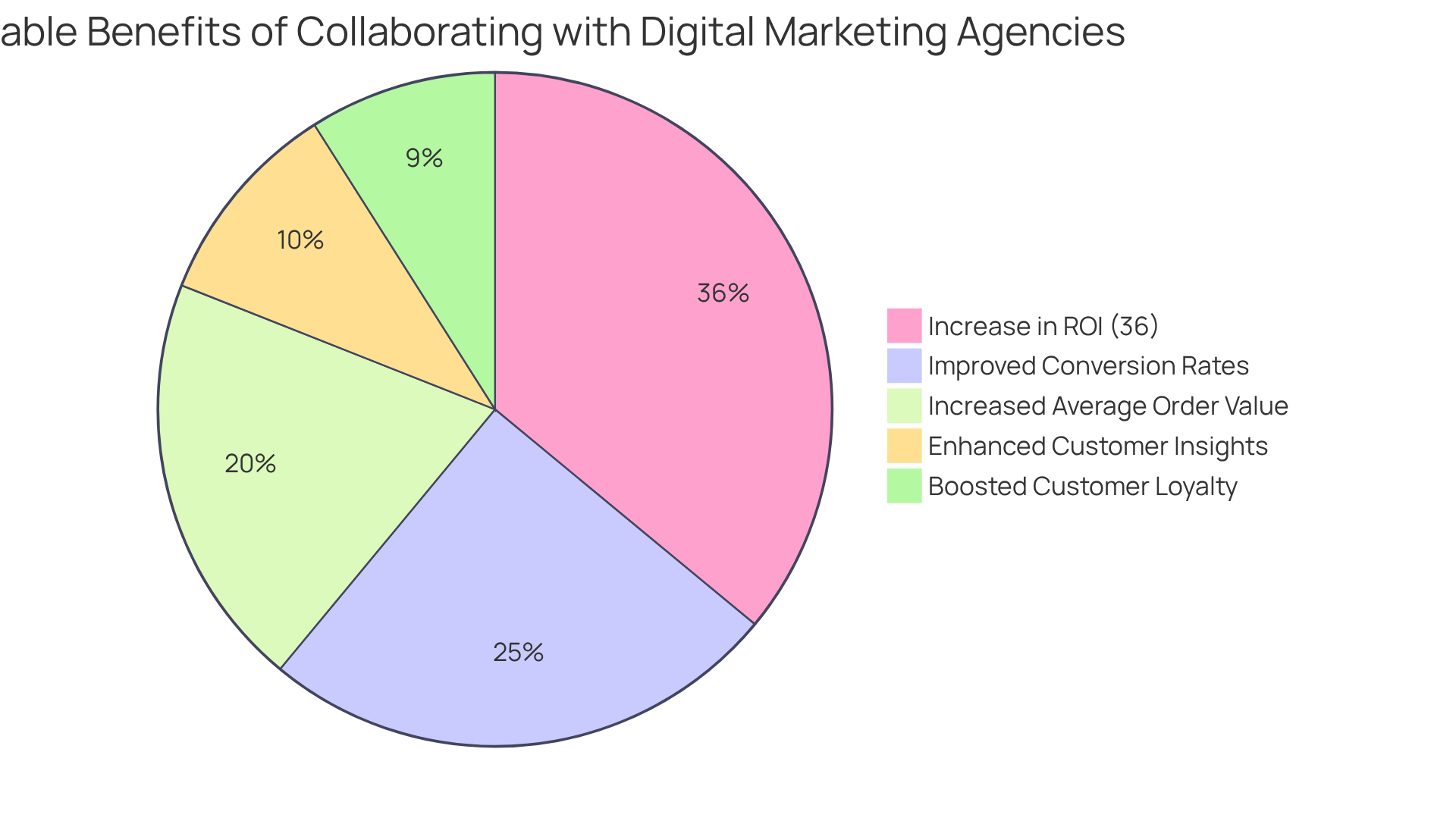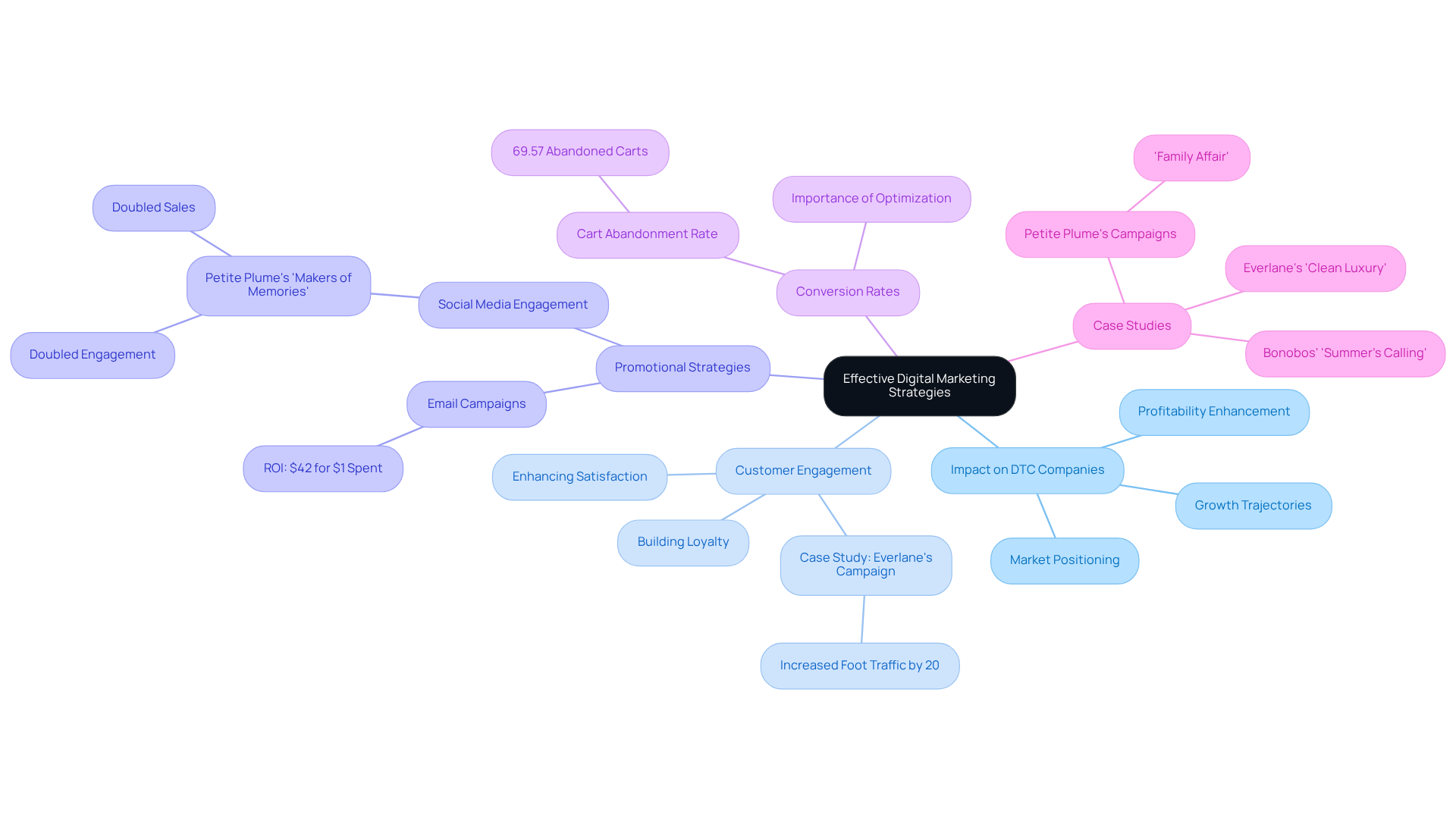
Overview
Agency digital marketing is pivotal for the success of Direct-to-Consumer (DTC) brands. It significantly enhances brand visibility, optimizes conversion rates, and drives sales through tailored strategies and data-driven insights. This article underscores how agencies empower DTC companies to navigate challenges such as escalating customer acquisition costs while effectively engaging their target audiences. Consequently, this leads to measurable improvements in key performance indicators, including return on investment and customer retention.
Introduction
The eCommerce landscape has undergone rapid evolution, now valued at over $5 trillion, rendering digital marketing agencies indispensable for the success of Direct-to-Consumer (DTC) brands. These agencies not only enhance brand visibility and optimize conversion rates but also provide critical insights that empower companies to connect authentically with their audiences.
However, as customer acquisition costs soar and competition intensifies, many DTC brands face the formidable challenge of effectively navigating this complex environment.
What strategies can these brands adopt to ensure they thrive in a market where agency support is not merely beneficial, but essential for sustainable growth?
Define the Role of Digital Marketing Agencies in DTC Success
Agency digital marketing firms are essential for the success of Direct-to-Consumer (DTC) brands. They provide specialized services that significantly enhance brand visibility, optimize conversion rates, and drive sales. The global eCommerce sector, valued at over $5 trillion in 2022, underscores the critical need for effective digital promotion strategies in this rapidly evolving landscape. By harnessing data analysis and insights into consumer behavior, these organizations craft tailored campaigns that resonate with target audiences.
For instance, they conduct comprehensive competitor evaluations and user behavior research, enabling DTC companies to refine their promotional strategies and boost customer engagement. Moreover, agency digital marketing utilizes advanced tools and technologies for effective tracking and optimization of promotional efforts, enabling DTC brands to swiftly adapt to shifting market conditions and consumer preferences. This adaptability is crucial in an environment where digital promotion often proves , with lower costs associated with social media advertising compared to television and print campaigns.
Additionally, storytelling plays a pivotal role in marketing, helping DTC companies forge connections with their audiences and foster loyalty. As a result, partnering with an agency digital marketing firm can lead to measurable improvements in key performance indicators, including:
Furthermore, retention strategies developed by these organizations are essential for DTC profitability, ensuring that companies not only attract customers but also sustain their engagement over time.

Identify Key Challenges DTC Brands Face Without Agency Support
Without the assistance of , direct-to-consumer (DTC) companies encounter significant obstacles that can impede their growth. A major challenge is the escalating customer acquisition costs, which have surged by 25% to 40% across various channels, swiftly eroding profit margins. These companies often struggle to effectively target their audience, resulting in wasted marketing expenditure and low conversion rates. Additionally, many DTC companies lack the internal expertise necessary to analyze data efficiently and implement data-informed strategies. This shortfall can lead to missed opportunities for optimization and growth.
As Mike Salguero, founder and CEO of ButcherBox, aptly states, "It’s tougher than ever for direct-to-consumer companies to capture customers’ attention." Furthermore, in the absence of organizational support, DTC companies may find it challenging to keep pace with rapidly evolving consumer behaviors and market trends, ultimately jeopardizing their competitive advantage.
For instance, companies that initially thrive on paid promotion often experience diminishing returns as acquisition costs rise, necessitating a shift to more sustainable growth strategies. In this context, leveraging the expertise of agency digital marketing becomes essential for navigating these challenges and achieving lasting success.

Examine the Measurable Benefits of Agency Collaboration for DTC Brands
Collaborating with an agency digital marketing firm offers DTC companies a range of quantifiable advantages that can significantly enhance their performance. For instance, organizations can implement A/B testing and conversion optimization strategies, leading to improved conversion rates and increased average order values (AOV).
Parah Group has consistently achieved a remarkable 36% increase in ROI on ads for its clients, illustrating the substantial improvement in return on investment (ROI) derived from advertising campaigns. Moreover, agency digital marketing provides invaluable insights through user session recordings and customer surveys, enabling companies to gain a deeper understanding of their audience and adapt their offerings accordingly.
This not only boosts sales but also fosters customer loyalty, as companies can create more personalized and engaging shopping experiences. Successful case studies, such as Harry's, which attained a $1.4 billion valuation by authentically connecting with consumers, and Glossier, which attributed 70% of its growth to organic channels, underscore how effective A/B testing and tailored promotional strategies can lead to significant increases in conversion rates and overall performance.
In the current competitive landscape, collaboration with agency digital marketing is essential for DTC companies to navigate challenges and respond to evolving consumer behaviors.

Analyze the Long-Term Impact of Effective Digital Marketing Strategies
Effective agency digital marketing strategies significantly influence the long-term success of DTC companies, shaping their growth trajectories and market positioning. By consistently utilizing data-driven strategies, companies can foster strong connections with their customers, leading to enhanced loyalty and more frequent purchases. This commitment not only enhances profitability but also strengthens a company's reputation in the marketplace.
As DTC companies navigate changing consumer preferences and market dynamics, utilizing first-party data becomes essential. This information allows companies to consistently improve their promotional strategies, ensuring they stay pertinent and competitive in a constantly changing environment. Ultimately, the ongoing success of DTC companies is grounded in their commitment to that prioritize customer engagement and satisfaction.
For example, brands that successfully leverage email campaigns can observe an impressive return on investment, with enterprises gaining $42 for each dollar spent. Furthermore, case studies show that campaigns such as Petite Plume's 'Makers of Memories' not only doubled engagement on social media but also led to a notable rise in sales, illustrating the tangible advantages of strategic digital promotional efforts.
Moreover, Everlane's campaign, which increased foot traffic by 20%, demonstrates how effective promotion can enhance customer engagement. Additionally, with almost 69.57% of online shopping carts left behind prior to checkout, enhancing conversion rates is essential for direct-to-consumer companies. This holistic approach to agency digital marketing, as emphasized by Parah Group, aligns all aspects of a brand's website and marketing strategy to foster growth and customer loyalty.

Conclusion
Agency digital marketing stands as a cornerstone of success for Direct-to-Consumer (DTC) brands, providing the expertise and resources necessary to navigate a competitive landscape. By leveraging specialized services, these agencies enhance brand visibility, optimize conversion rates, and drive sustainable sales growth. As the eCommerce sector continues to expand, the importance of effective digital marketing strategies becomes increasingly clear.
Key points throughout the article illustrate how agency collaboration addresses the myriad challenges DTC brands face, including rising customer acquisition costs and the need for data-informed strategies. The measurable benefits of this partnership are evident in compelling statistics, showcasing a notable increase in ROI and improved customer retention. Successful case studies further highlight how brands like Harry's and Glossier have thrived through tailored marketing efforts that resonate with their audiences.
In conclusion, the role of agency digital marketing is not merely beneficial but essential for DTC brands aiming for long-term success. As consumer behaviors and market dynamics evolve, embracing a data-driven approach and strategic collaboration will empower brands to foster deeper connections with their customers. The future of DTC lies in the hands of those who recognize the value of agency support in crafting compelling narratives and optimizing their marketing strategies to adapt to an ever-changing landscape.
Frequently Asked Questions
What is the role of digital marketing agencies in the success of Direct-to-Consumer (DTC) brands?
Digital marketing agencies are essential for DTC brands as they provide specialized services that enhance brand visibility, optimize conversion rates, and drive sales through tailored campaigns.
Why is digital marketing important for the eCommerce sector?
The eCommerce sector, valued at over $5 trillion in 2022, requires effective digital promotion strategies to succeed in a rapidly evolving landscape, making digital marketing crucial for brand visibility and sales.
How do digital marketing agencies utilize data analysis?
They harness data analysis and insights into consumer behavior to craft tailored campaigns, conduct competitor evaluations, and refine promotional strategies to boost customer engagement.
What tools do digital marketing agencies use for tracking and optimization?
Agencies utilize advanced tools and technologies that allow for effective tracking and optimization of promotional efforts, enabling DTC brands to adapt quickly to changing market conditions and consumer preferences.
How does digital marketing compare to traditional marketing methods?
Digital promotion is often more cost-effective than traditional methods, with lower costs associated with social media advertising compared to television and print campaigns.
What role does storytelling play in DTC marketing?
Storytelling helps DTC companies forge connections with their audiences and foster loyalty, making it a pivotal aspect of their marketing strategies.
What measurable improvements can DTC brands expect from partnering with a digital marketing agency?
DTC brands can see measurable improvements such as a 36% increase in ROI on advertising and enhanced average order values (AOV).
Why are retention strategies important for DTC profitability?
Retention strategies developed by digital marketing agencies are essential for ensuring that DTC companies not only attract customers but also sustain their engagement over time, contributing to overall profitability.
FAQs











